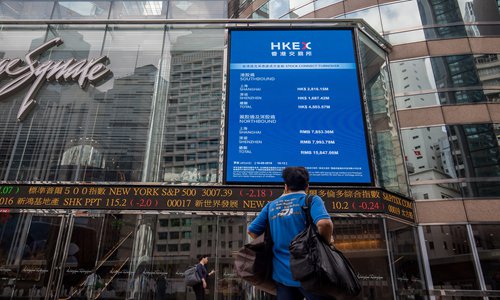
A pedestrian walks outside the Hong Kong Stock Exchange on Monday. Photo: VCG
Hong Kong's financial industry, a major driver of the local economy, has stumbled amid the unrest that has swept across the city, prompting industry insiders to call for harsher measures in addition to the new anti-mask law to end violence, restore social order and rebuild market confidence.
The turnover of the Hong Kong stock market declined 19 percent year-on-year in the past two quarters amid cruel and violent acts, which heaped pressure on the local financial industry especially small and medium-sized securities dealers that also face hefty rents and surging regulatory costs, Gordon Tsui, president of the Hong Kong Securities Association, told media at a lunch on Tuesday.
In the first nine months, 22 securities dealers voluntarily ceased or suspended operations, up 38 percent year-on-year, Tsui was quoted as saying in a Radio Television Hong Kong report.
But Tsui said that 30 securities brokers were also set up in the first three quarters, a new record high. "Some industry players have begun to lay off workers, but the situation has not deteriorated so far," Tsui said.
He expected that the Hong Kong government could reduce or waive license fees to help the financial industry endure the hardship.
"The business environment will continue to wane in the fourth quarter, which - coupled with the China-US trade war and ongoing social unrest - could weigh on people's willingness to invest" in Hong Kong, Tsui said.
Companies from the Chinese mainland used to be a major force in Hong Kong's stock market. But current low valuations and weak market confidence due to the riots have deterred companies from launching IPOs in Hong Kong, Dong Shaopeng, a senior research fellow at the Chongyang Institute for Financial Studies of Renmin University of China in Beijing, told the Global Times on Wednesday.
Chinese technology giant Alibaba reportedly postponed its multibillion-dollar IPOs plan in Hong Kong in August.
Industry observers said that although the Hong Kong Special Administrative Region government enacted an anti-mask law by evoking emergency powers to quell violence last week, it will take time to see how effective the law would be.
Dong also urged the local government to take more powerful and sweeping measures to penalize the rioters and secessionists. In recent days, widespread rampages amid the anti-government protests have hurt various industries including consumption, retail and investment. Now, rioters use shops, stores, banks and public transports as major targets to attack.
"The third-quarter data recorded negative growth, and the downturn would continue in the fourth quarter," Liao Qun, general manager and chief economist of the Research Department at China CITIC Bank International, told the Global Times. "As long as the violence ends, it will help restore social order and rebuild market confidence."


